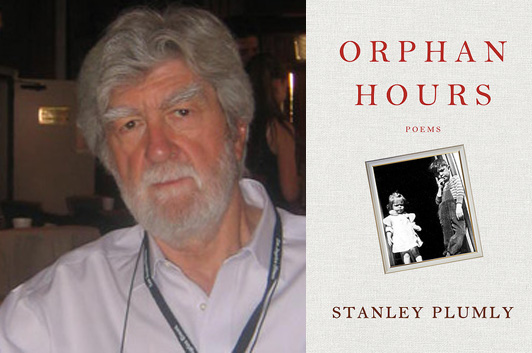Stanley Plumly, “Lapsed Meadows”

photo: Ron Hogan/GalleyCat
Wild has its skills. the apple grew so close
to the ground it seemed the tree was thicket,
crab, and root, and by fall would look like brush
among the burdock and the hawkweed, as if at heart
it had been cut and piled for burning.
Along the edges, at the corners, like failed fence,
the hawthorns, by comparison, seemed planted.
Everywhere else there was broom grass, timothy,
and wood fern, and sometimes a sapling,
sometimes a run of hazel; sometimes, depending,
fruit still green or grounded and rotting underfoot.
I remember, in Ohio, fields of wastes of nature,
lost pasture, fallow clearings, buckwheat
and fireweed and broken sparrow nests,
especially in the summer, in the fading hilltop sun,
when you could lose yourself by simply lying down.
Who will find you, who will call you home now, at dusk,
with the dry tips of the goldenrod confused”
with a little wind, filling in for what’s left of the light?
Orphan Hours is the eleventh book of poems by Stanley Plumly; I took this photo of him in 2008, after he’d just won the Los Angeles Times Book Prize for Old Heart. Other poems in this new collection include “Cancer (originally published in The New Yorker), “Afterward” (Kenyon Review), “Vesper Sparrow” (The New Republic), and “Verisimilitude” (The Atlantic). “Amidon Christmas Tree Farm Cardinal” was originally published in The Atlantic as “Cardinal.”
13 July 2012 | poetry |
Mark Strand, “With Only the Stars to Guide Us”

photo: Timothy Greenfield-Sanders
Whenever the giants turned in for the night, taking their huge toys with them, we were left nothing to play with, and slept under sofas and chairs. The gift of bigness would never be ours. This was a truth against which we had tried again and again to turn our tiny backs, and each time had failed. Undone by sorrow, some of us found solace in prayer, and others, like ourselves, chose to follow wild dogs through the dark, moose-crowded woods of the northland, nursing our hurt until we dropped.
Almost Invisible is a collection of short prose poems by former U.S. poet laureate Mark Strand published at the beginning of 2012. It collects works from, among other publications, Slate (“The Engima of the Infinitesimal” and “Every So Many Hundred Years Hence“), LIttle Star (“The Students of the Ineffable” and “The Triumph of the Infinite”), and Poetry (“Futility in Key West,” “Mystery and Solitude in Topeka,” “No Words Can Describe It,” “The Minister of Culture Gets His Wish,” and “The Mysterious Arrival of an Unusual Letter“).
Oh, and five poems in Boston Review, where Nicholas Christopher praises Strand for his “clean lines, taut narratives, and carefully framed mise-en-scènes.” I’d add only that they have for me the surreal specificity of dream images—sharp, distinct tableaux of things that shouldn’t quite fit together yet somehow do, and in doing so impress themselves upon your memory.
5 July 2012 | poetry |

 Our Endless and Proper Work is my new book with Belt Publishing about starting (and sticking to) a productive writing practice.
Our Endless and Proper Work is my new book with Belt Publishing about starting (and sticking to) a productive writing practice. 
